Mü

Commentary: Mü as written has a serious endgame problem where outrageous
things can happen, such as 4 of 5 players trying to have a bid
be made so that a player at 196 points doesn't get a 5 point bonus for the
bid being missed and thus win. This semi-random endgame variant has almost
completely eliminated the endgame problem in our group and greatly improved
everyone's enjoyment. I came up with this idea in June, 1999 and since then
various other groups have also used it in some form to good effect. Highly
recommended. Feel free to vary the exact parameters of the scheme for
better effect with your group.
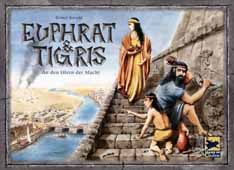
Euphrat & Tigris
Commentary: This rule makes monument building slightly less productive in the short term. With the rules as written, most single plays give a player 1 VP. Tile plays which also connect to a Treasure and allow a player to take it give 2 VP. This is the most VP that can be gained via most plays not involving external conflicts. The exception is the tile play to construct a monument. This scores a player 1 VP immediately plus 2 VP at the end of his turn (assuming he has both color leaders which he almost always will) for a total of 3 VP (and of course the great potential for more later).
I find that players building monuments which they can't defend leads to a very
random game as the monuments are continually battled over and the luck
of the tile draw comes to dominate what is essentially a game of skill. By
slightly reducing the short-term gain of monuments to 2 VP, players are
discouraged from building monuments they can not hold. Players who can
successfully hold the monuments will of course continue to build them.
King of the Elves
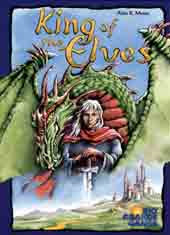
2A) A player who plays an Escort card for a realm does not collect double Gold for Gold cards in that realm, even his own.
2B) If at the end of a round, a player has more than one Gold card in his hand, he must discard all those above one but does receive random replacement cards for those Gold cards he discards.
It is recommended to use only 2A or 2B, not both. In fact, use of rule 1 on its own would serve to significantly reduce the need for either variant of rule 2.
Commentary on 1: It is a very effective strategy to hoard cards (particular Gold but see below for comments on this) in this game as having a large set of cards gives you the greatest flexibility (and thus efficiency) in moving and thus earns you more money for the average card play. In addition, holding lots of cards gives you the opportunity to play lots of cards in a single round and thus both A) achieve the 10 point visit all villages bonus and B) visit the villages with your Gold cards on them multiple times. As a result, I have seen players achieve a score of nearly 100 gold on a single round. The hand limit is set to a fairly high value in order to not force a player with a very bad draw in the early round to desperately try to move as can happen in Elfenland with the fill to eight cards rule.
Commentary on 2A and 2B: These rules are really meant to address the same
problem so I will address them together. The Gold cards are Very
powerful cards in that they can fairly easily, with skillful play, gain you 12
gold by play on a high value village such as a Desert and then visiting that
village twice either by virtue of the Revese Direction cards or by
circling around and hitting the village again. Many players, me included, feel
they are somewhat unbalanced, particularly when 'hoarded'. Other players, in
recognition of this, will thus play Trouble or Thief tokens where
you play Gold cards but you can often easily Escort yourself by
these. Rule 2A prevents this strategy from being effective as it makes
you then lose the Gold bonus. Rationale for this: your escorts would demand a
large share of the gold from you if you were to take it.
Rule 2B is to prevent a player from hoarding the Gold cards. A player
in a recent game was lucky enough with drawing the 4 Gold cards (and then
redrawing them after playing them) that he managed to play Gold cards 5 times
during the 4 rounds of the game including 3 Gold cards in the last round
alone. The other 3 players got 1, 0, and 0 Gold cards respectively during
the course of the game. There are several advantages to the hoarding
strategy. 1) Obviously, if you hoard them until the last round, other players
can never use them, giving you a huge advantage. 2) Gold cards are almost
always played on high-value villages (4-7) as they thus cause the largest
increase in value. One strategy is to play a high value village (say a 6
Desert) in front of yourself and then on the next turn play a Gold card on it.
However, this strategy can be foiled by another player playing a Gold card on
the village before you have a chance to; however, this can't happen if you
have all the Gold cards (and is less likely if you hoard 2 or more of them).
Finally, the hoard the Gold strategy wonderfully combines with the
hoard the cards strategy as you can in the final round lay
down 3-4 Gold cards on high-value villages and then take advantage of your
huge set of cards to visit each of these double-valued villages multiple times.
You will also likely have several Escorts available to get you around any
really problematic obstacles other players play. This can lead to 100+ Gold
gaining rounds.
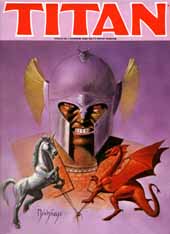
Titan
Commentary: These two rules help to even out the luck in starting positions
so that one player does not have a significant advantage in open space such
as happens with a 2-3-4-6 configuration for the player in tower 6.
The rule for randomizing who starts is because of the fact that certain towers
are considered more favorable for recruiting on the initial roll as they
allow a player who splits his Gargoyles to get two recruits on a roll
of a 2 or a 5 (towers 6, 3, 5, 2 respectively). Thus, the standard rule
doubly disfavors the player in Tower 1 as he both goes last and is in a
'bad' tower. An even more equal option might be to have the player who
goes first be the one in the tower listed first here: 4, 1, 5, 2, 6, 3, and
then proceed clockwise in descending tower order from there.
Mamma Mia

Commentary: Drawing the Mamma Mia card is a significant advantage in this game for two reasons. First, it may very well give you an extra turn during the following round over players going later in the sequence. Second, there will usually be a bunch of ingredients left over from the prior round. Since you know you will be going first, you can hold several pizzas in your hand and be ready to take great advantage of this set of ingredients on your first play of the second round. There are no disadvantages to drawing the card.
With this rule, a small offsetting disadvantage is introduced as your hand
size is effectively reduced by one card. Also, there is a side effect in
that other players do not know in advance who will go first next round. IMHO,
both of these things are very positive. Highly Recommended. My thanks
to Dave Arnott for introducing me to this variant but he did not come up
with it.

Die Siedler von Catan
Commentary: This rule slightly weakens the effect of the Robber shutting down
a space. It results in a 1 in 18 chance of his returning home. Although
the Robber starts in the Desert, with most players he never returns there.
In addition, it makes the 2 and 12 somewhat more significant, given that they
are underreprsented on the board as the only production numbers which only
appear once. I really like this rule. We also play with the reroll all
7's rolled during the first two rounds of turns variant.
Schnappchen Jagd

Commentary: The super-trump cards are, IMHO, a disadvantage to draw,
particularly in a 3-player game, where the only way the use of one can result
in a net positive trick is if both the other cards on the trick can be
converted for positive points. It is basically a no brainer
to play your super-trump card on a trick which already has the other
super-trump card on it. The other player will be stuck with a guaranteed
at least -1 point trick and you will not have to find a perfect trick
to play yours on (and also take the lead to the next trick which is
generally a disadvantage in this game). This rule totally discourages that
play.
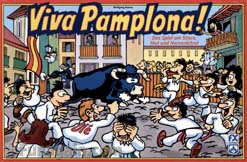
Viva Pamplona
Commentary: Although this is a pretty random game, the order definitely does
favor the player who moves last in the round. This player can move single
pawns on the bull and be sure to not have them pushed back before he charges
which makes a 4 point swing. He can also, going into the stadium, set himself
up in the best position based on the other players' moves.
Code 777
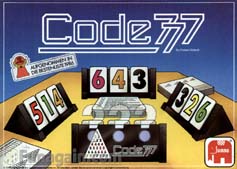
2) Allow players to at any time commit to guessing their tiles but first ask a 'special question'. This 'special question' can be any question in the game and is answered by the player on the left of the player committing to a guess.
Commentary: 1) With the rules I have, certain players have a huge advantage in guessing a new set as they know a huge number of unavailable tiles for their set. With this change, everyone always has exactly the same amount of tile knowledge to start with.
2) Concept taken from Sleuth and recommended particularly with experienced
players. Sometimes a player knows two of his tiles and only one question
on the list can give him his final one. This makes it very random how
long it takes for him to get this question answered and, in the worst case,
when it comes up he himself must answer it. Try to not let this rule slow
the game down.
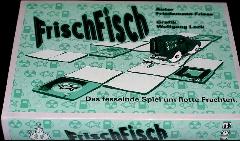
FrischFisch
Commentary: With the standard rules, bids are often extremely low and
uninteresting. This rule frees up players to use their bidding chips and
refocuses the game on making the shortest possible routes.
Electronic Outburst

I really like the device but don't like the scoring system at all. I therefore suggest using the device only to provide the categories, keep time, and allow you to mark off answers as they are given. Ignore the scoring system and play system and do the following instead. Keep score on paper.
Play: Consider every round to be a 'Challenge' round where the two teams bid to play the category after the category Title is read out. This is done by one team bidding first with how many items they think they will get, and then the other team can raise their bid or pass, and so on until one team wins the bid. There will always have to be one player not playing, once the round starts, but during the bidding, the person holding the device and reading the category can be anyone as the answers are not initially listed so anybody can read out the category. Just give the device to the team which loses the bid to mark off answers once the auction is over. Whichever team wins the bid then plays the round calling out answers as usual and at the end of the time discussing which ones were missed. If a team successfully gets at least their bid in answers, they score that many positive points. If they fail, they score that many negative points (or the positive points go to the other team). There is no advantage in naming more answers than you bid but it is usually still fun to try to get as many as you can. Play your choice of a set number of rounds or until the device wants to end the game.
Commentary: Some categories are much easier than others and so, with the basic rules, there is a significant luck element in getting easy categories. With this variant, this element goes away and you introduce a very interesting bidding (and possibly bluffing) element to the game which I find greatly enjoyable. Which team bids first can either alternate or you can let the team which is behind always bid first.
Odd number of players variant: Most party games only work well with an even number of players. We wanted to play one with 5 players recently so I came up with this variant which worked exceedingly well, with a number of us actually preferring it to set teams. This variant works great with Outburst but would not work for most party games unfortunately.
Play: As above, but teams vary. The device should simply be passed around in a circle and whoever holds the device will be moderator for the given round and will not be involved in the scoring. The players to the moderator's left will form one team and the players on the right will form the other team (thus teams vary as the moderator changes). Bidding is as above with the team on the left always bidding first. Scoring is by individual but both players on a team at any given point always score the same. We scored it (for a bid of 7) as 7 7 -7 -7 (and 0 for the moderator) if the team on the left either made a bid of 7 or the team on the right missed a bid of 7 but just giving positive points to one team's players would also work. Play a number of rounds divisible by the number of players and then add up individual scores from all the rounds. Also, I would sugest reseating players after each full round (where each player is moderator once) so that as many possible combinations of players can be a team during the game.
Commentary: Has three benefits: 1) Allows you to play with an odd number of
players which is very rare for a party game. 2) Allows varying teams so
everybody gets to team up at some point. 3) Allows individual scoring (if
you care) so a single person wins at the end.
Funkenschlag (original version)
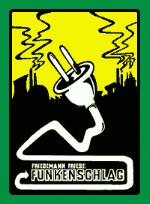
Commentary: Without this rule, a serious clog can appear in the game where there
are no good plants for a number of turns and players all just sit back and
accumulate cash until the clog breaks. This highly disfavors whoever has the
worst income position and their only way to break the clog is to buy a plant they
don't want and make their position even worse. Highly recommended.
Apparently the new 2004 version of the game (Power Grid in the US)
incorporates this variant into the main rules.
Merchant of Venus
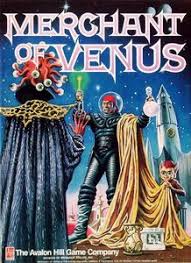
Commentary: Without this rule, players going 4th or 5th (I would never play
with 6) can get seriously screwed. They can often not just get screwed on turn
1 but for many turns. They may end up following player 1 to the West and then have
that player also end up rolling well and getting to the second system ahead of them
as well and this can keep happening which is an absolute disaster. Despite this
rule, I would without a second's thought choose to be first player over fourth.
Nearly any player order balancing rule which keeps this statement true is a good one.
Just One
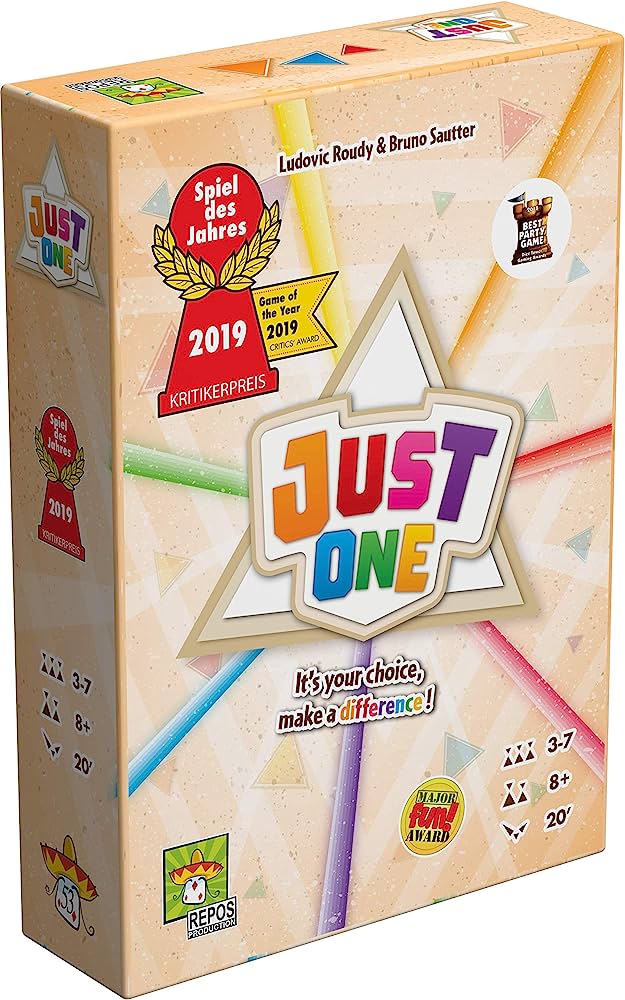
The Gang

Commentary: The 3 and 4 player games are too easy and this variant makes them more difficult but still quite doable. I actually think you may get to the point of wanting to go to 3 hands with 3 players, 2 hands with 5 players, and maybe 1.5 hands with 6 players (3 players with 1, 3 players with 2).
 Please send Aaron EMAIL if you have any
comments on or suggestions for these pages or if you just want to say hi.
Please send Aaron EMAIL if you have any
comments on or suggestions for these pages or if you just want to say hi.
 Alternatively,
you can
Alternatively,
you can
 To return to the Last Homely House Game Room
To return to the Last Homely House Game Room